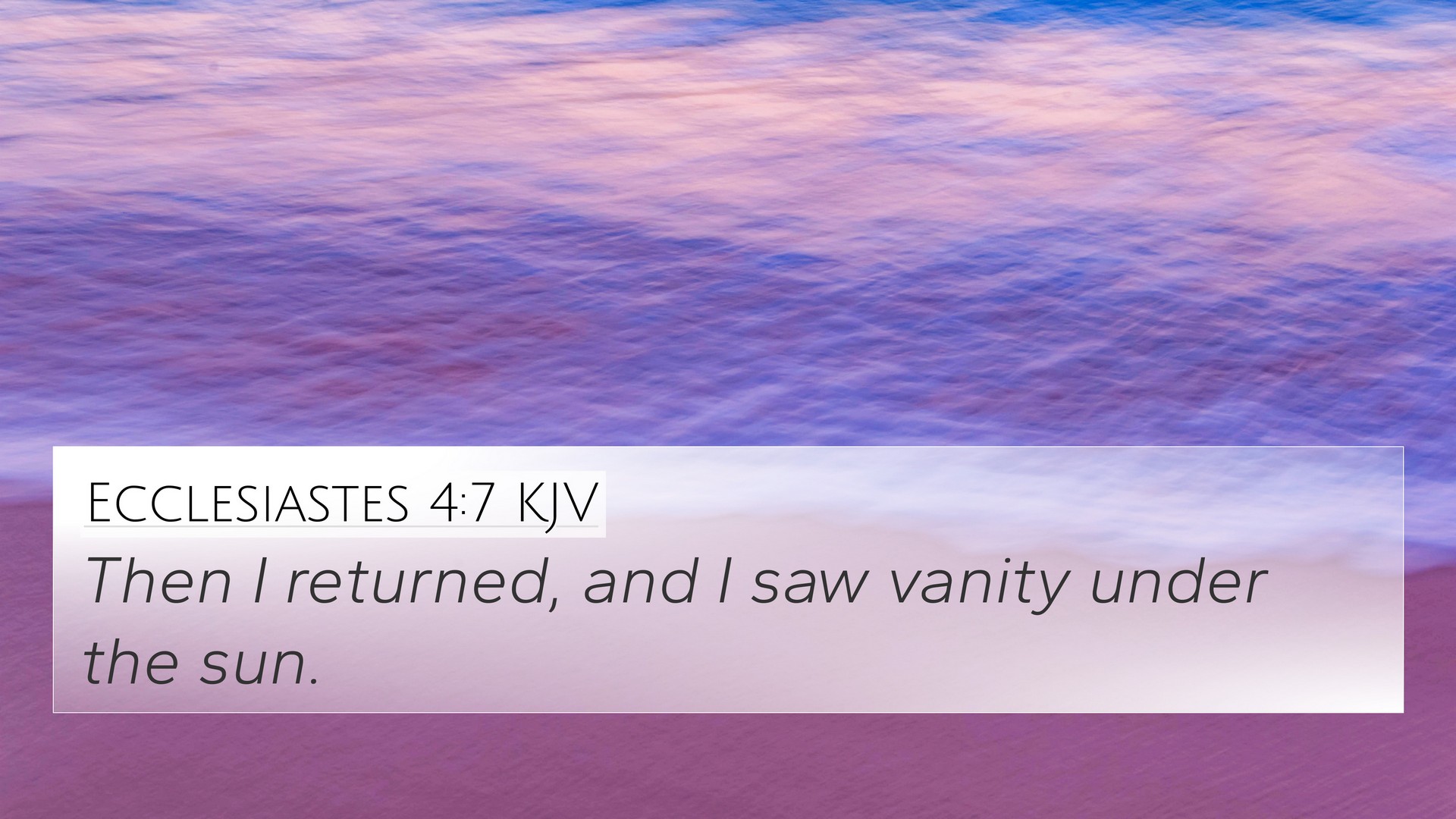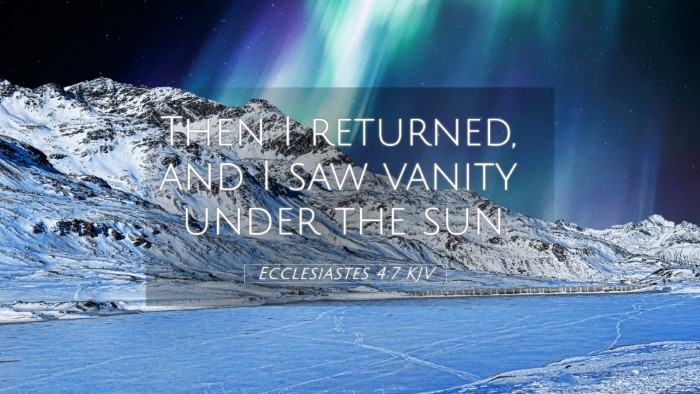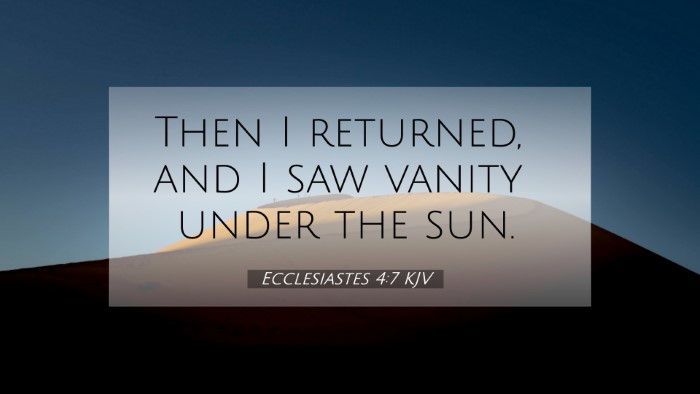Old Testament
Genesis Exodus Leviticus Numbers Deuteronomy Joshua Judges Ruth 1 Samuel 2 Samuel 1 Kings 2 Kings 1 Chronicles 2 Chronicles Ezra Nehemiah Esther Job Psalms Proverbs Ecclesiastes Song of Solomon Isaiah Jeremiah Lamentations Ezekiel Daniel Hosea Joel Amos Obadiah Jonah Micah Nahum Habakkuk Zephaniah Haggai Zechariah MalachiEcclesiastes 4:7 Similar Verses
Ecclesiastes 4:7 Cross References
Then I returned, and I saw vanity under the sun.
Uncover the Rich Themes and Topics of This Bible Verse
Listed below are the Bible themes associated with Ecclesiastes 4:7. We invite you to explore each theme to gain deeper insights into the Scriptures.
Ecclesiastes 4:7 Cross Reference Verses
This section features a detailed cross-reference designed to enrich your understanding of the Scriptures. Below, you will find carefully selected verses that echo the themes and teachings related to Ecclesiastes 4:7 KJV. Click on any image to explore detailed analyses of related Bible verses and uncover deeper theological insights.
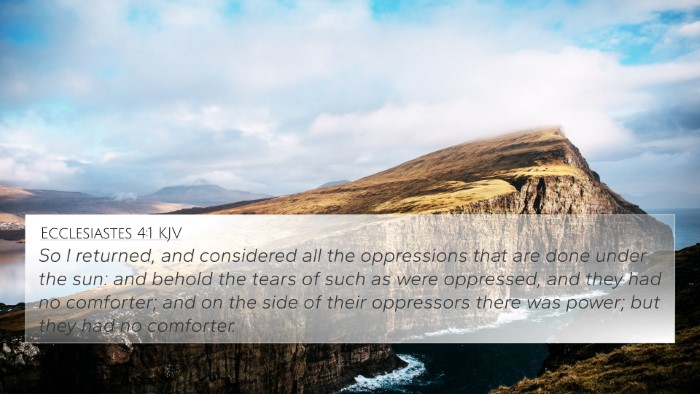
Ecclesiastes 4:1 (KJV) »
So I returned, and considered all the oppressions that are done under the sun: and behold the tears of such as were oppressed, and they had no comforter; and on the side of their oppressors there was power; but they had no comforter.
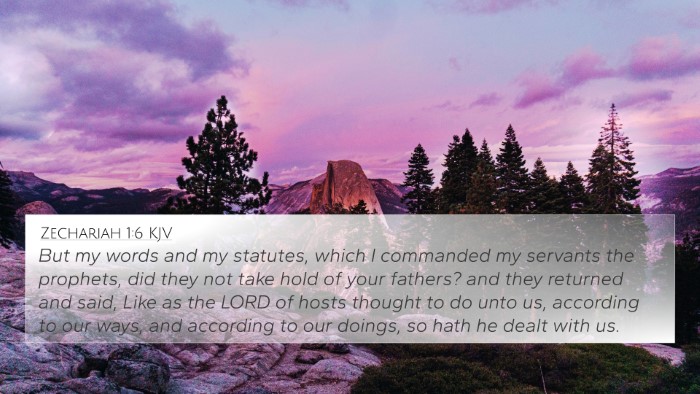
Zechariah 1:6 (KJV) »
But my words and my statutes, which I commanded my servants the prophets, did they not take hold of your fathers? and they returned and said, Like as the LORD of hosts thought to do unto us, according to our ways, and according to our doings, so hath he dealt with us.
Ecclesiastes 4:7 Verse Analysis and Similar Verses
Ecclesiastes 4:7 states:
“I returned, and saw vanity under the sun.”
Summary and Interpretation
This verse explores the theme of vanity and the futility of seeking fulfillment in worldly pursuits. It suggests a deep contemplation of life's transient nature.
Context and Background
Ecclesiastes is a meditative reflection by King Solomon on the meaning of life. Recognized for its philosophical approach, this book emphasizes the fleeting nature of existence and the recurring cycles of human life. In this passage, Solomon observes another instance of disappointment and futility.
Commentary Insights
-
Matthew Henry:
Henry suggests that the writer's return implies a searching for meaning amidst a world filled with vanity. He emphasizes the struggle of human beings to find substance in their toil, often leading to despair.
-
Albert Barnes:
Barnes comments on the perspective of the speaker, who recognizes that even in diligent pursuit, the results often lead to emptiness. The phrase "under the sun" underscores the limited human viewpoint, separated from divine understanding.
-
Adam Clarke:
Clarke notes that the repetition of the notion of vanity serves as a reminder of the limitations of human achievements and aspirations. He asserts that, as one reflects on life, the essential truths about human existence become painfully clear.
Thematic Connections
This verse aligns with several overarching themes found throughout the Bible that explore the dualities of life, human effort, and divine purpose:
- Transience of Life: Similar to Psalm 39:5 which reflects on the briefness of life.
- The Futility of Earthly Pursuits: Paralleled in Matthew 16:26 which questions the value of gaining worldly wealth at the cost of one's soul.
- Human Labor and Life’s Meaning: Connected to Proverbs 14:23 emphasizing that all effort apart from God leads to vanity.
- Divine Understanding vs. Human Knowledge: Related to Isaiah 55:8-9, illustrating the profound gap between divine wisdom and human reasoning.
- Existential Reflection: Echoed in Job 30:20, where Job laments his state, searching for God amid his suffering.
- Hope Beyond Vanity: As seen in Romans 8:20-21, which speaks about creation's futility waiting for redemption.
- True Satisfaction:** Reaffirmed in Philippians 4:19, indicating that God supplies all needs, transcending earthly fulfillment.
Cross-Reference Verses
In studying Ecclesiastes 4:7, one can find connections to various biblical texts, which provide a broader context:
- Ecclesiastes 1:14 - "I have seen all the works that are done under the sun; and, behold, all is vanity and vexation of spirit."
- Proverbs 28:19 - "He that tilleth his land shall have plenty of bread: but he that followeth after vain persons shall have poverty enough."
- 1 Corinthians 15:58 - "Therefore, my beloved brethren, be ye stedfast, unmovable, always abounding in the work of the Lord..."
- 2 Corinthians 4:18 - "While we look not at the things which are seen, but at the things which are not seen..."
- Philippians 3:8 - "Yea doubtless, and I count all things but loss for the excellency of the knowledge of Christ Jesus my Lord."
- James 4:14 - "For what is your life? It is even a vapor, that appeareth for a little time, and then vanisheth away."
- Colossians 3:2 - "Set your affection on things above, not on things on the earth."
Conclusion
Ecclesiastes 4:7, while brief, encapsulates a profound truth about the human condition. It urges readers to reflect on their pursuits, the impermanence of life and relationships, and the need to seek meaning beyond the fleeting moments "under the sun.” By cross-referencing this verse with others, one can gain a more comprehensive understanding of the Bible's teachings on vanity and purpose, contributing to a deeper engagement with the Scriptures.
Future Study Recommendations
To gain further insights into the themes of vanity and purpose, consider exploring:
- How Bible cross-referencing can illuminate connections between Ecclesiastes and other wisdom literature.
- Using a Bible concordance to identify thematic verses on vanity and fulfillment.
- Engaging in cross-reference Bible study methods to compare passages on life's meaning.
- Tools for Bible cross-referencing that facilitate deeper scriptural understanding.
